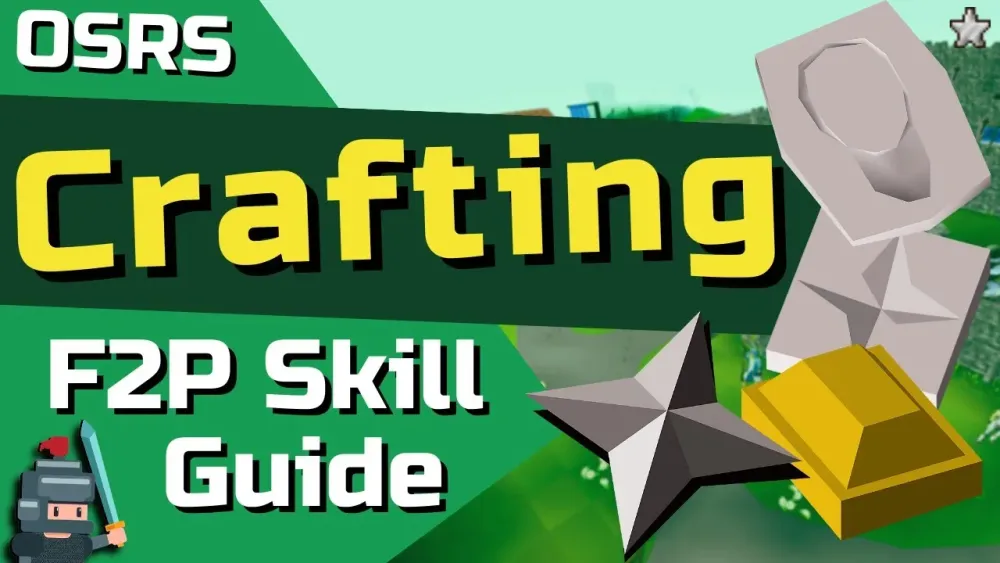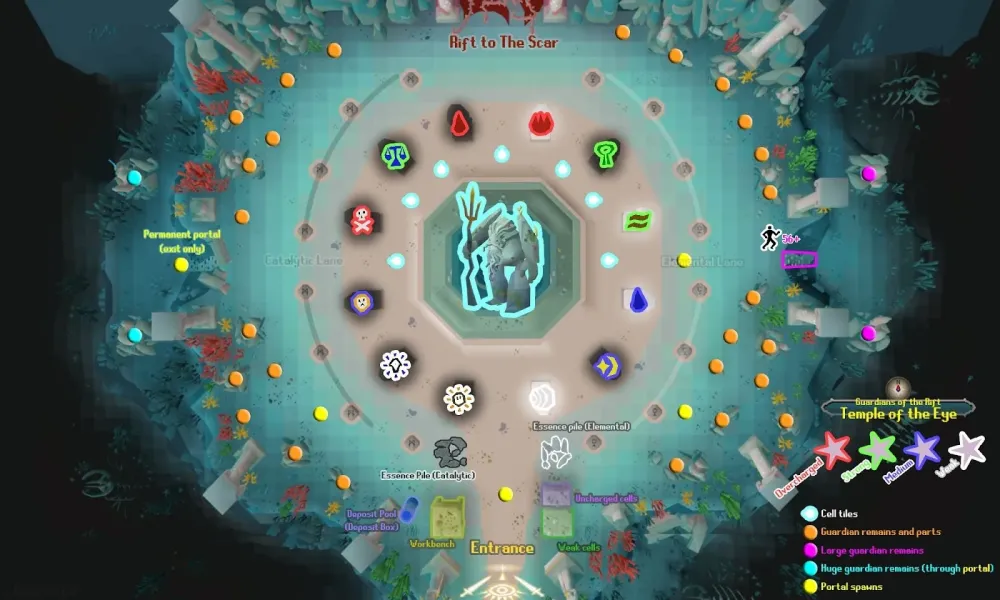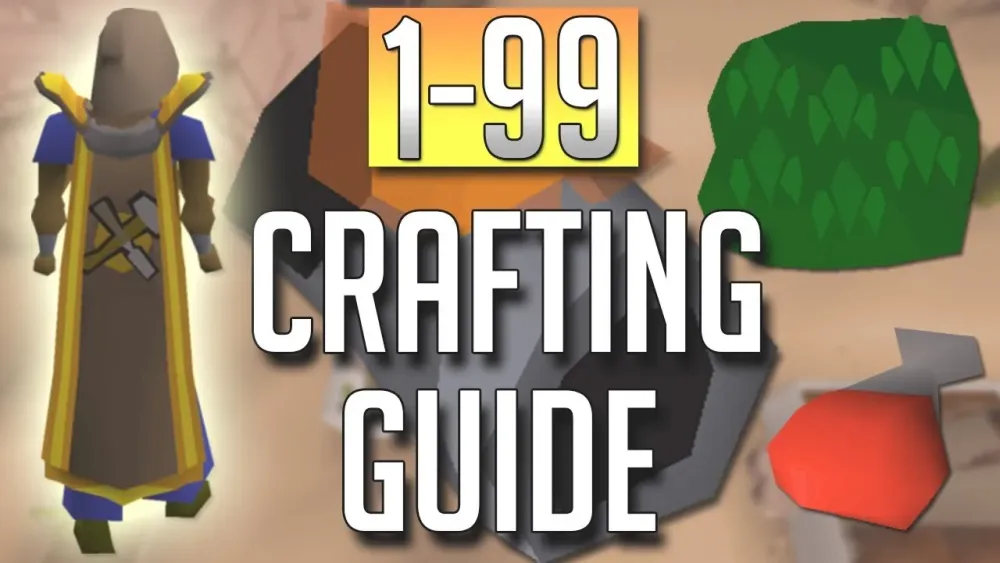Your cart is empty
Ultimate Free-to-Play Crafting Guide for OSRS

Crafting in Old School RuneScape (OSRS) is a versatile skill that allows players to create a wide range of items, from jewelry and pottery to armor and weapons. This guide aims to provide a comprehensive overview of crafting, focusing on the free-to-play aspects of the game. By understanding the basics of crafting and how to efficiently gather the necessary materials, players can enhance their gameplay experience while also making a profit.
To begin your crafting journey in OSRS, you’ll need specific tools and materials. The primary tools for crafting include the needle, thread, chisel, and hammer. The needle and thread are essential for sewing items like leather armor, while the chisel is used for shaping items such as gemstones and pottery. A hammer is required for smithing activities, allowing you to create various metal items.
As for materials, players can gather a variety of resources to kickstart their crafting endeavors. Leather, for example, is obtained by tanning cowhide or hide dropped by various creatures. You can tan cowhide at any tanning store, such as the one in Al Kharid, using 1 GP per hide. Another critical resource is gemstones, which can be mined from specific rocks or purchased from gem shops. These gems are used in crafting jewelry, which provides both experience and potential monetary gain.
For those interested in pottery, clay is a fundamental material that can be found near water sources or mined from clay rocks. Once you have clay, you can mold it into various pottery items at a pottery wheel and then fire them in a furnace to create usable items. This process is an excellent way to gain crafting experience while being accessible to free-to-play users.
Additionally, players can gather raw materials from the environment. Gathering resources like logs can provide you with the wood needed for crafting bows and other wooden items. By visiting the various trees around the game world, you can chop down logs and then use a knife to craft them into desired shapes.
In summary, getting started with crafting in OSRS involves acquiring the right tools and gathering essential materials. By focusing on these elements, players can efficiently level up their crafting skills and explore the vast opportunities that this essential skill offers in the game.
3. Essential Crafting Skills for Free-to-Play Players

Crafting in Old School RuneScape (OSRS) can be an incredibly rewarding skill, especially for free-to-play players. Whether you want to create jewelry, pottery, or leather goods, understanding the essentials can help you level up quickly. Here are the key crafting skills every free-to-play player should focus on:
- Pottery: This is one of the first crafting skills you’ll encounter. You can create items like pots and bowls by using clay at a pottery wheel and then firing them in a pottery oven. Not only does this skill provide experience, but the items can also be used for quests.
- Leatherworking: Crafting leather items is another vital skill. You can tan cowhide into leather by using it on a tanner. From there, you can craft items like gloves and boots, which are useful for combat.
- Jewelry Making: Creating jewelry is a great way to gain crafting experience. Using gold or silver bars, you can craft items such as rings and amulets, which provide various bonuses and can be sold for a nice profit.
- Glassblowing: Once you reach level 40 crafting, you can start working with molten glass. This skill allows you to create items like vials and lanterns, which are essential for potions and other activities.
Each of these skills has its own unique benefits and offers different crafting experiences. By focusing on these essentials, free-to-play players can maximize their crafting potential and enjoy all that OSRS has to offer.
4. Step-by-Step Crafting Guide: From Beginner to Intermediate

Ready to dive into crafting? This step-by-step guide will help you progress from a beginner to an intermediate level in no time!
Step 1: Start with Pottery
Begin your crafting journey by gathering clay. Follow these steps:
- Collect clay from various clay rocks found around Gielinor.
- Head to a pottery wheel and create a pot or bowl.
- Fire your creations in a pottery oven to complete the process.
Step 2: Move on to Leatherworking
Once you’ve got the hang of pottery, it’s time to work with leather:
- Kill cows to collect cowhide.
- Use a tanner to tan the cowhide into leather.
- Craft items like leather gloves or boots at a crafting table.
Step 3: Explore Jewelry Making
Jewelry making is a fun and profitable skill:
- Mine or purchase gold or silver bars.
- Visit a furnace to craft rings and amulets.
- Wear or sell your jewelry for extra coins.
Step 4: Introduce Glassblowing
Once you reach level 40, glassblowing is your next step:
- Collect seaweed and soda ash to create molten glass.
- Use a furnace to create vials or lanterns.
- Utilize these items for quests or sell them for profit.
By following these steps, you’ll quickly move from a beginner to an intermediate crafter in OSRS. Remember, practice makes perfect, so keep crafting and enjoy the journey!
5. Best Crafting Methods for Free-to-Play
When it comes to crafting in Old School RuneScape (OSRS) as a free-to-play player, you want to maximize your experience gains while keeping costs low. Below are some of the best methods you can use:
- Making Leather Items: Start by collecting cowhide from cows located near Lumbridge. You can tan the cowhide into leather at the tanner in Al Kharid. From there, craft leather items such as leather gloves or leather boots. This method offers a decent experience and the materials are inexpensive.
- Crafting Bowstrings: If you’re looking for a method that requires minimal cost, crafting bowstrings is a great option. Simply collect flax from the fields, and spin them into bowstrings at the spinning wheel in Lumbridge. This method yields 15 experience per bowstring, and you can craft multiple in a short amount of time.
- Making Uncut Gems: As you progress, you can collect uncut gems through mining or purchasing them from other players. Cutting these gems provides a significant experience boost, with higher-level gems offering more experience. Keep an eye on your inventory for opportunities to gather these gems.
- Crafting Glass: Once you reach level 40 crafting, you can craft glass items. Collect sand from the desert or the nearby swamps and then use a furnace to create glass. You can then craft items such as vials or glasses for additional experience.
In summary, focus on these methods to efficiently level up your crafting in free-to-play OSRS. The key is to balance cost and experience gained, so choose the method that fits your playstyle!
6. Crafting Quests and Their Benefits
Quests in Old School RuneScape can be a fantastic way to boost your crafting experience and unlock new crafting opportunities. Here’s a look at some notable crafting quests and the benefits they provide:
| Quest Name | Required Level | Experience Reward | Benefits |
|---|---|---|---|
| Dragon Slayer | No specific level, but combat level is recommended | 18,650 Crafting XP | Unlocks access to the ability to wear green d’hide and dragon equipment. |
| Lost City | 31 Crafting | 3,000 Crafting XP | Unlocks the ability to craft dragon weapons and gain access to the city of Zanaris. |
| Shield of Arrav | No specific level | 1,000 Crafting XP | Allows players to craft a shield and gain access to additional quests. |
Completing these quests not only provides crafting experience but also unlocks new crafting materials and abilities. They often have fun storylines and challenges that keep the game engaging. So, don’t hesitate to dive into these quests to enhance your crafting journey in OSRS!
7. Tips and Tricks for Efficient Crafting
Crafting in Old School RuneScape (OSRS) can be a rewarding experience, especially when you know how to maximize your efficiency. Here are some tips and tricks to help you level up your crafting skills faster and more effectively:
- Plan Your Routes: Before you start crafting, plan the most efficient routes for gathering materials. Use teleportation spells or items to reduce travel time.
- Use the Best Tools: Always use the best crafting tools available to you. For example, a goldsmithing gauntlet will help you gain extra experience when smelting gold.
- Banking Strategy: If you’re crafting items that require multiple materials, consider banking your items regularly to save time. Use nearby banks or teleportation methods to minimize travel.
- Join a Clan: Being part of a crafting-focused clan can provide you with valuable tips and support. Plus, you might find crafting buddies to make the experience more enjoyable.
- Use Experience Lamps: Whenever you receive experience lamps or bonuses, don’t hesitate to use them on crafting to gain quick levels.
- Craft Items with High Demand: Focus on crafting items that are in high demand in the Grand Exchange. This way, you can profit while training your skill.
- Stay Updated: Always check for updates or new methods introduced in the game. The OSRS community is active, and new efficient crafting methods can emerge.
8. Common Mistakes to Avoid in Crafting
While crafting can be a fun and rewarding skill, there are several common pitfalls that players often fall into. Here’s a list of mistakes you should avoid to ensure a smoother crafting journey:
- Ignoring Your Level: Don’t try to craft items that are far beyond your current level. Stick to items that match your skill level to avoid wasting materials.
- Not Using Bonuses: Some players forget to utilize crafting bonuses, like artisans’ outfit or specific items that increase crafting experience. Make sure to equip these for better efficiency.
- Overlooking Materials: Always check the materials required before crafting. Running out of a crucial item can slow down your progress significantly.
- Neglecting Inventory Space: Ensure you have enough inventory space when gathering materials. Running back and forth to the bank wastes time.
- Failing to Diversify: Sticking to one crafting method can become tedious. Diversify your crafting by trying different items to keep the experience fresh and engaging.
- Forgetting to Take Breaks: Crafting can become monotonous. Take short breaks to avoid burnout, which can negatively impact your gameplay.
- Not Tracking Your Progress: Keeping track of your levels and goals can help you stay motivated. Use a spreadsheet or note app to monitor your crafting journey.
Ultimate Free-to-Play Crafting Guide for OSRS
Crafting is a versatile skill in Old School RuneScape (OSRS) that allows players to create various items, from jewelry to armor. For free-to-play players, mastering this skill can be a significant asset, providing both utility and profit. This guide will help you navigate through the essentials of crafting effectively.
Getting Started with Crafting
To begin your crafting journey, you first need to visit a crafting tutor. The primary tutor is located in Lumbridge, where you can learn the basics of the skill.
Materials Needed
Here are some essential materials you will need:
- Leather (from cows or sheep)
- Gold bars (mined or purchased)
- Gemstones (found or bought)
- Silk (from spinning flax)
Crafting Techniques
The following are key crafting techniques available to free-to-play players:
| Item | Level Required | XP Gained | Materials Needed |
|---|---|---|---|
| Leather Boots | 1 | 13 | 1 Leather |
| Gold Ring | 5 | 15 | 1 Gold Bar |
| Amulet of Power | 8 | 15 | 1 Gold Bar, 1 Gemstone |
Training Tips
To level up your crafting skill efficiently, consider these tips:
- Focus on leather items until level 5.
- Switch to gold jewelry for better XP gains.
- Utilize the Grand Exchange for buying and selling materials.
Conclusion and Further Resources
Crafting in OSRS can be both rewarding and profitable, especially for free-to-play players. By following this guide, you can efficiently develop your skills and enhance your gameplay experience. For additional resources, consider checking out the OSRS Wiki for in-depth item information and player community forums for tips and strategies.

